Best sales intelligence tools: Top picks for 2025
- Janis Kolomenskis
- 1 day ago
- 18 min read
In today's hyper-competitive market, cold outreach is a losing game. The average response rate is a dismal 2%, and generic pitches get deleted instantly. The real secret to smashing quotas isn't shouting louder; it's knowing precisely who to talk to and, more importantly, how to secure a warm introduction. This is where sales intelligence (SI) tools come in, transforming your entire go-to-market strategy.
Forget the old model of buying massive, often outdated, contact lists. Modern SI platforms are your strategic co-pilot, using AI to uncover hidden relationships, pinpoint active buyer intent, and map the fastest, most trusted path to a closed deal. To truly stop cold calling and start connecting, mastering B2B lead generation best practices is essential for leveraging these powerful tools effectively. They turn guesswork into a science, ensuring every outreach is personal, relevant, and timely.
We've spent countless hours researching, testing, and comparing the top contenders to bring you the definitive list of the 12 best sales intelligence tools for 2025. Inside, you'll find an honest breakdown of platforms like Yena, ZoomInfo, Apollo.io, and more, complete with screenshots, direct links, and clear use cases. Whether you're a founder accelerating fundraising, a specialized recruiting firm sourcing top talent, or an enterprise sales team looking to crush your targets, this guide will help you find the perfect tool to transform your pipeline and make every outreach count.
1. Yena
Yena stands out as a premier choice in our list of the best sales intelligence tools by fundamentally shifting the go-to-market playbook from cold outreach to warm, relationship-driven introductions. It’s an AI-powered relationship intelligence platform that transforms your team's disparate contacts from LinkedIn, Gmail, Outlook, and your ATS into a unified, private network. Instead of just providing static contact lists, Yena maps your entire extended network to find the strongest, most direct introduction paths to your target prospects.
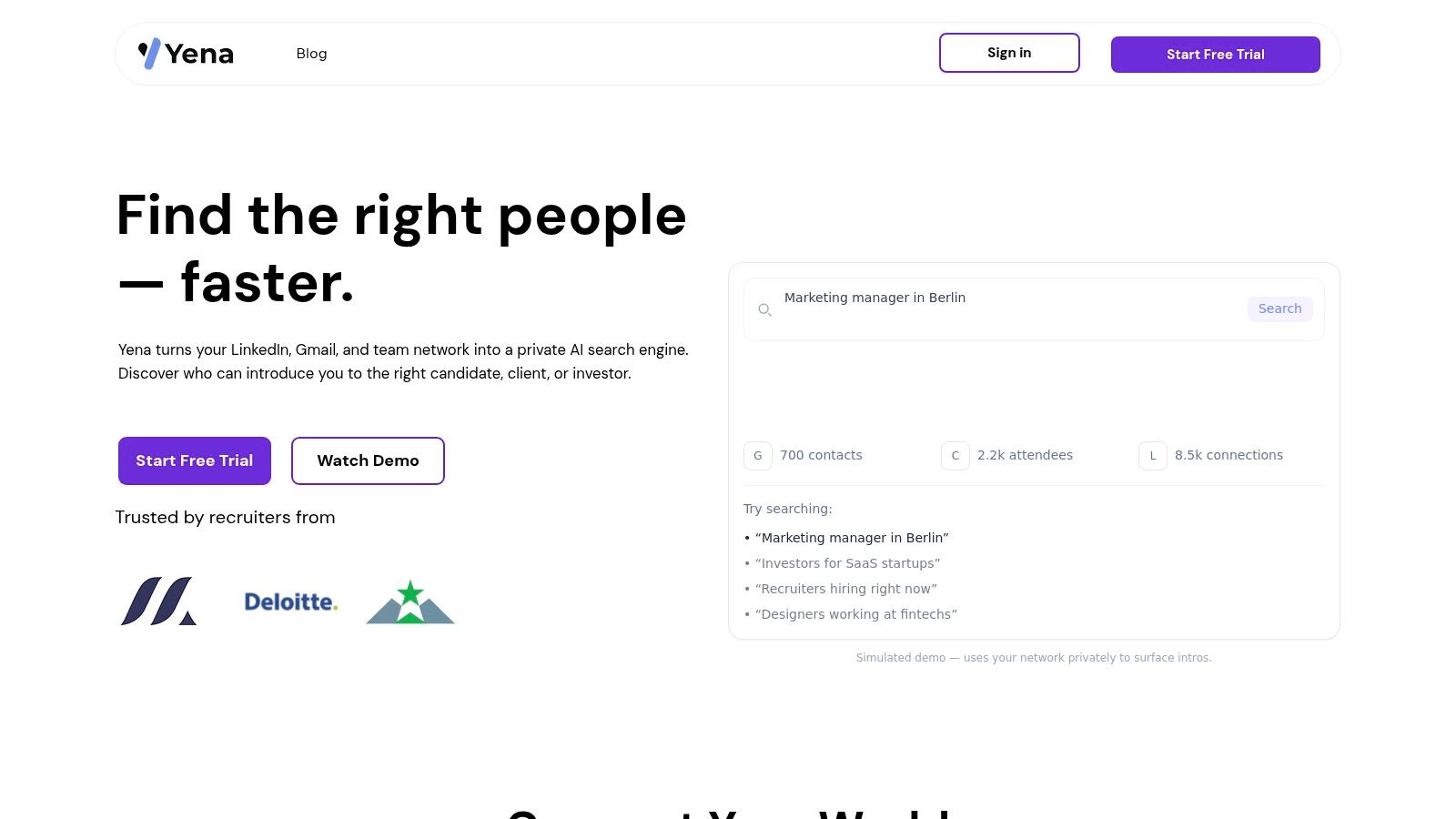
The platform’s Network Intelligence AI is its crown jewel. It allows you to use natural-language queries like “VP of Engineering at Series B SaaS companies” and, within about 60 seconds, returns a ranked list of multi-hop introduction paths, complete with confidence scores. This isn't just about finding who you need to talk to; it's about discovering the best way to get that conversation started. Yena enriches each connection with vital context, including shared events, past employers, and mutual engagement history, giving you compelling reasons to request an introduction.
Key Features & Use Cases
AI-Powered Pathfinding: Yena's semantic search scans over 50,000 extended connections per user to surface the warmest, most effective introduction routes, complete with confidence scores. This is ideal for sales teams breaking into high-value accounts where a trusted intro is non-negotiable.
Collaborative Workflows: The platform includes in-app tools for teams to request, track, and even gamify introductions. This creates a culture of connectivity, measures success rates, and provides clear ROI, helping leaders identify their most effective internal connectors.
Significant ROI: Yena boasts impressive metrics, with users reporting a 67% response rate on warm introductions (compared to a 2% industry average for cold outreach) and a 40% faster time-to-close. The platform also claims it can replace tools like LinkedIn Sales Navigator, saving organizations over $15,000 annually.
Who Is It Best For?
Yena is a powerful asset for any team that relies on relationships. It’s particularly effective for boutique executive search firms, high-growth SMEs (especially in the DACH/CEE region), VCs, and founders. Sales and partnership managers will find its ability to unlock warm introductions invaluable for accelerating deal cycles and expanding their ecosystem.
Pricing & Access
Yena does not list public pricing on its website. However, they offer a free 14-day trial with no credit card required, allowing you to experience the platform's full capabilities firsthand. For detailed pricing and enterprise controls, you will need to contact their sales team.
Website: https://yena.ai
2. ZoomInfo — SalesOS
ZoomInfo SalesOS is the undisputed heavyweight champion in the B2B data world, offering an enterprise-grade platform that’s practically synonymous with sales intelligence. For teams looking to fuel high-volume outbound and sophisticated Account-Based Marketing (ABM) strategies, ZoomInfo provides a firehose of contact and company data, especially within the US market. Its vast database, packed with direct dials and detailed org charts, acts as a foundational layer for countless successful sales organizations.
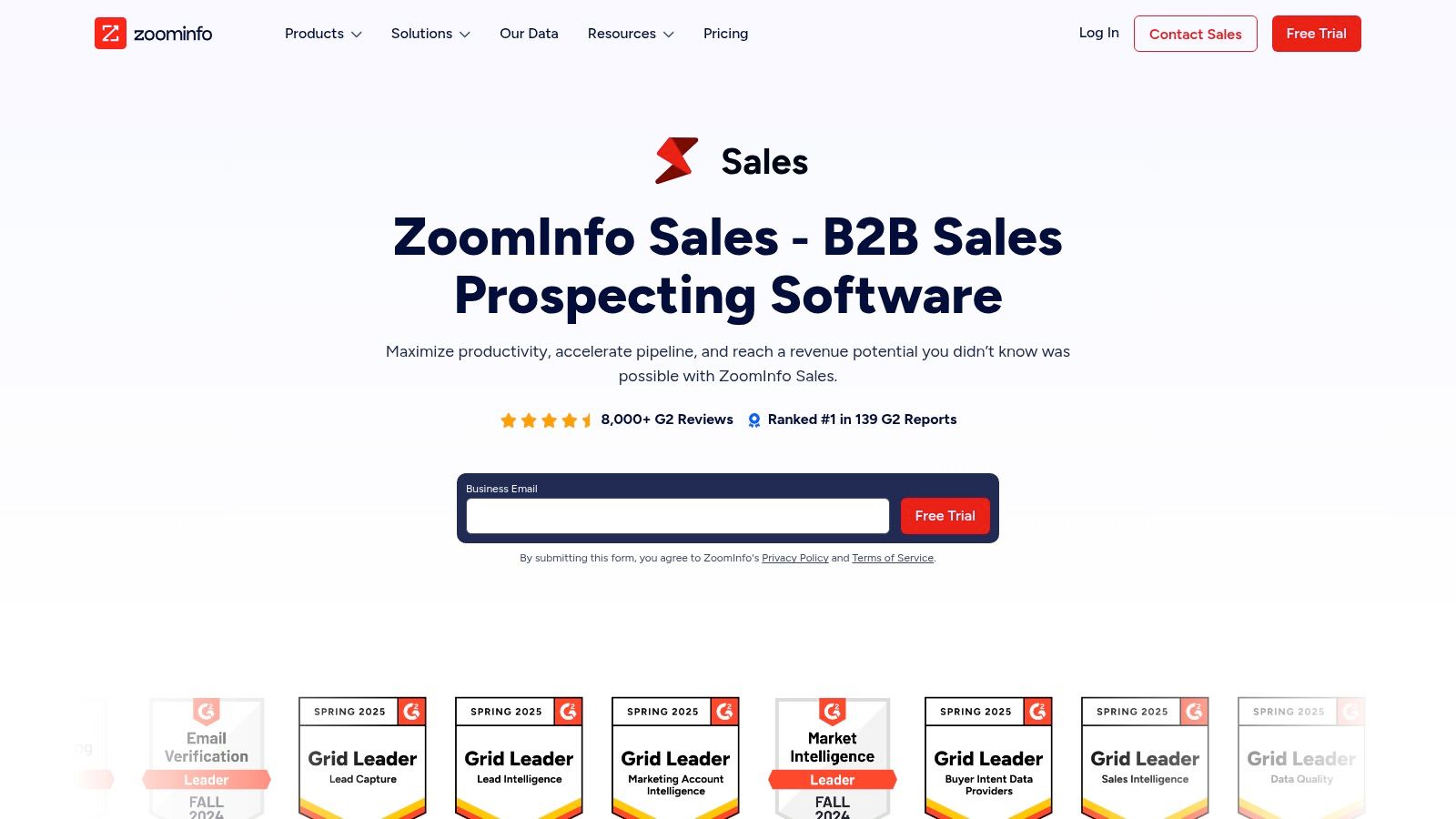
What makes ZoomInfo one of the best sales intelligence tools is its sheer scale and the maturity of its ecosystem. Beyond just data, it layers on powerful intent signals and website de-anonymization (through its WebSights feature), letting you see which target accounts are actively researching solutions like yours. The platform’s AI-driven recommendations and deep integrations with CRMs like Salesforce and SEPs like Outreach create a seamless workflow, automating list building and data enrichment right where your reps work.
Key Features & Use Cases
Extensive B2B Database: Access millions of contacts and companies, ideal for building targeted outbound prospecting lists.
Buyer Intent Signals: Identify and prioritize accounts actively in-market, a game-changer for ABM campaign timing.
Advanced Workflows: Automate data enrichment and list creation directly within your CRM or sales engagement platform.
Pros & Cons
3. LinkedIn Sales Navigator
LinkedIn Sales Navigator leverages the world's largest professional network, transforming it into a powerful relationship-selling and prospecting tool. Instead of offering a standalone database, it provides an intelligent layer on top of LinkedIn's existing ecosystem, making it indispensable for modern sales reps who prioritize social selling, account research, and warm outreach. It’s the go-to platform for identifying key decision-makers, understanding their professional history, and tracking company changes in real-time.
What solidifies LinkedIn Sales Navigator's spot among the best sales intelligence tools is its focus on relationship pathways. Features like TeamLink reveal how your team is connected to a prospect, paving the way for warm introductions instead of cold calls. Its advanced search filters allow for hyper-specific targeting based on seniority, function, company size, and more. While it doesn't provide direct dials or emails like data vendors, it excels at providing the context and connections needed to initiate meaningful conversations. Many teams find success using it alongside other data tools, which you can learn more about in this list of top LinkedIn Sales Navigator alternatives.
Key Features & Use Cases
Advanced Lead & Account Search: Utilize granular filters and AI-powered recommendations to find ideal customer profiles.
Real-Time Buyer Activity Alerts: Track job changes, company news, and prospect posts to time your outreach perfectly.
TeamLink Network Mapping: Discover and leverage internal connections for warm introductions to target accounts.
Website: https://business.linkedin.com/sales-solutions/sales-navigator
Pros & Cons
4. Apollo.io
Apollo.io has rapidly become the go-to all-in-one platform for SMBs and mid-market teams, brilliantly combining a massive B2B database with a built-in sales engagement suite. It’s a powerful, cost-effective solution for organizations that need to find prospects, enrich their data, and run multi-step outbound sequences without stitching together multiple tools. This unified approach simplifies the tech stack and empowers sales teams to move from prospecting to outreach in a single, fluid motion.
What truly sets Apollo.io apart and makes it one of the best sales intelligence tools is its exceptional value and accessibility. The platform democratizes access to high-quality data and engagement features through transparent, self-serve plans, including a generous free tier perfect for startups. Its Chrome extension is a powerhouse, allowing reps to find contact data directly on LinkedIn and corporate websites, research accounts, and enroll prospects into sequences on the fly. This seamless integration into the daily workflow dramatically boosts efficiency for high-velocity sales prospecting. To learn more about modern outreach, see these sales prospecting best practices to boost your pipeline.
Key Features & Use Cases
Unified Data & Engagement: Find contacts and launch email/call sequences from one platform, perfect for streamlining SMB outbound sales.
Buying Intent & AI Assistance: Use intent topics to find in-market accounts and leverage AI to research prospects and write personalized emails.
Powerful Chrome Extension: Instantly access contact data and sales intelligence while browsing LinkedIn or company websites.
Website: https://www.apollo.io
Pros & Cons
5. 6sense — Sales Intelligence
6sense is a true powerhouse in the Account-Based Marketing (ABM) space, offering a "Revenue AI" platform that goes beyond simple data provision. It’s designed for organizations committed to a highly targeted, intelligence-led sales motion. By combining robust company and contact data with its own powerful first-party and third-party intent signals, 6sense predicts which of your target accounts are in-market and ready to buy, often before they even know it themselves.
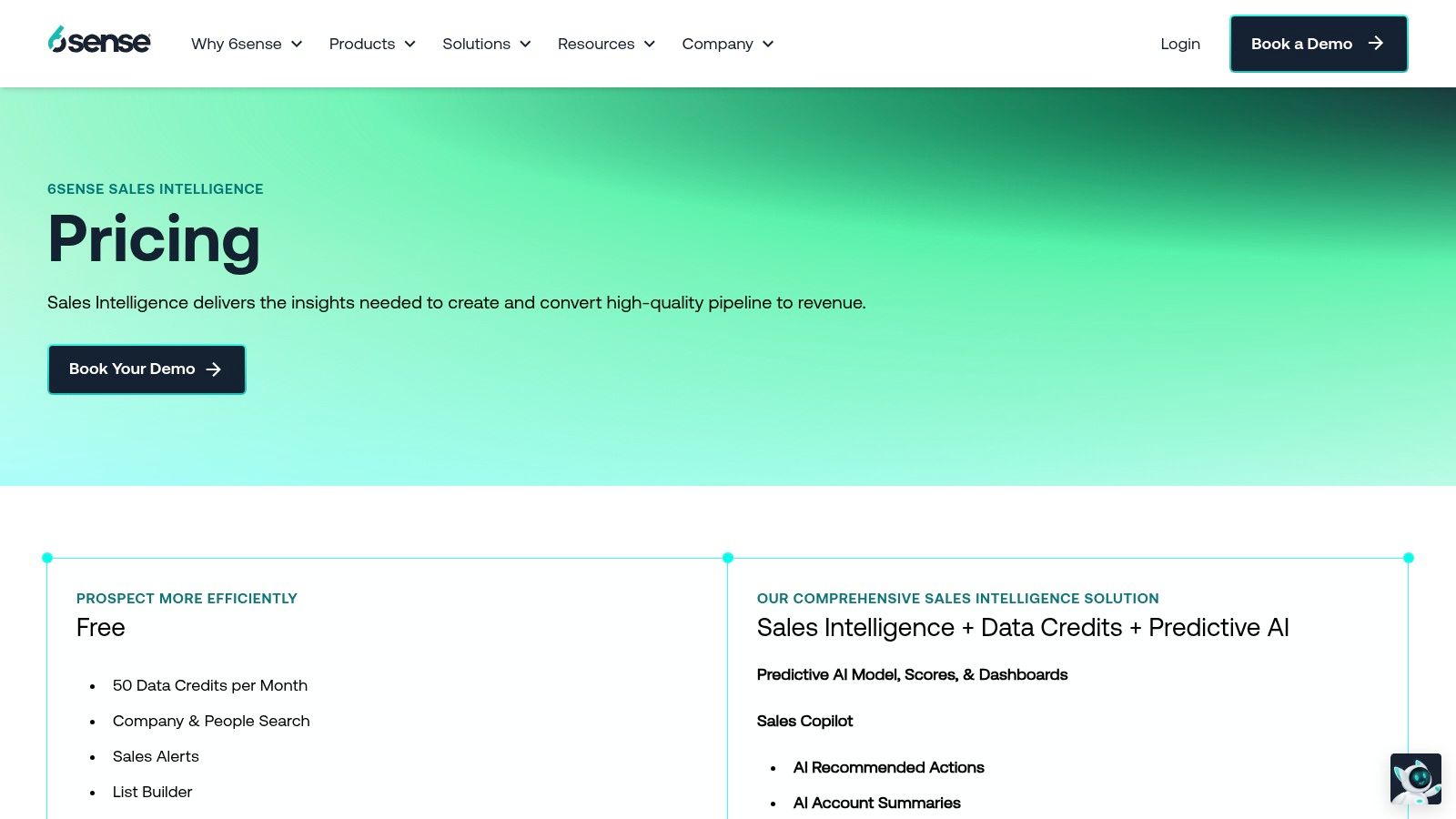
What solidifies 6sense’s position among the best sales intelligence tools is its focus on predictive analytics and AI-driven guidance. The platform doesn't just show you data; it interprets it, assigning predictive scores and identifying buying stages for each account. This allows revenue teams to stop guessing and start focusing their resources exclusively on accounts with the highest propensity to convert. The Sales Copilot provides actionable insights and next-step recommendations, empowering reps to engage with the right message at the perfect moment.
Key Features & Use Cases
Predictive AI Scores: Use AI-driven dashboards to identify and prioritize accounts showing strong buying signals.
1st & 3rd-Party Intent Data: Uncover hidden buyer journeys by tracking anonymous website activity and third-party research behavior.
Buying Stage Predictions: Tailor outreach by understanding if an account is in the awareness, consideration, or decision stage.
Pros & Cons
6. Lusha
Lusha is the go-to choice for sales teams and individual reps who need fast, accurate contact data without the enterprise-level complexity or cost. It excels with a simple, self-serve model built around a powerful browser extension that lets users reveal B2B contact details directly from LinkedIn profiles or company websites. This immediate time-to-value makes it a favorite among SDRs and recruiters who need to quickly build targeted lead lists and start outreach immediately.
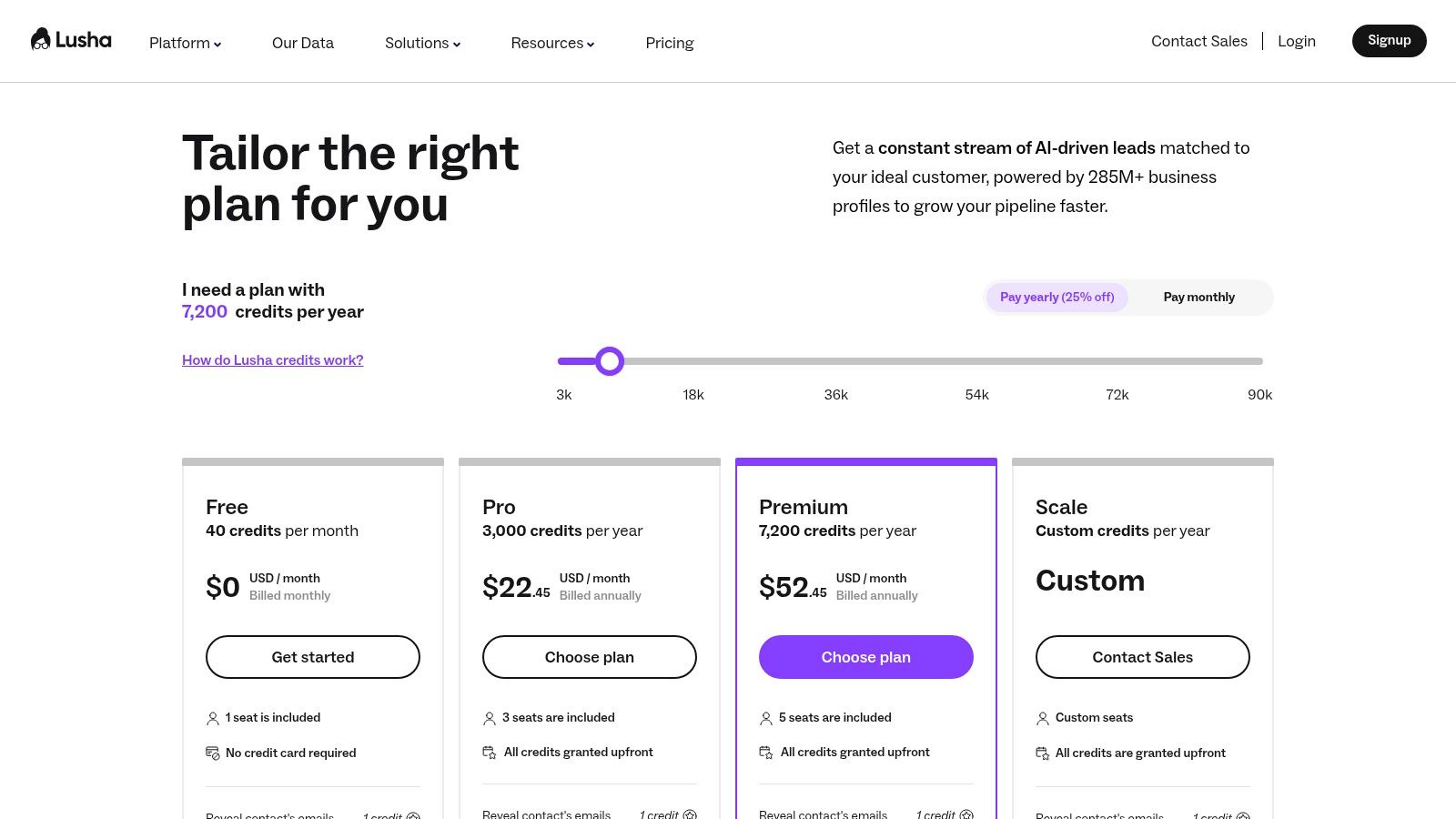
What makes Lusha one of the best sales intelligence tools for high-velocity teams is its straightforward, credit-based system and transparent pricing. You can get started with a generous free plan and scale up as your needs grow. The platform focuses on doing one thing exceptionally well: providing direct-dial phone numbers and verified business emails with high accuracy. This laser focus, combined with integrations into CRMs like Salesforce and HubSpot, ensures reps can enrich records and fuel their pipeline with minimal friction.
Key Features & Use Cases
Credit-Based Contact Reveals: Simple system where you use credits to unlock emails and phone numbers, ideal for managing prospecting budgets.
Browser Extension: Instantly find contact data on LinkedIn, company websites, and even within your CRM, streamlining workflow.
Generous Free Plan: Test the platform with monthly credits that even roll over, perfect for individual users or small teams just starting.
Website: https://www.lusha.com/pricing/
Pros & Cons
7. RocketReach
RocketReach serves as a powerful yet accessible entry point into the world of contact discovery, offering a self-serve platform that excels at quickly finding email addresses and phone numbers. It's particularly favored by individuals and small teams who need reliable B2B contact information without the complexity and cost of an enterprise-grade solution. The platform's straightforward search and intuitive browser extension make it incredibly efficient for ad-hoc lookups and targeted list-building exercises.
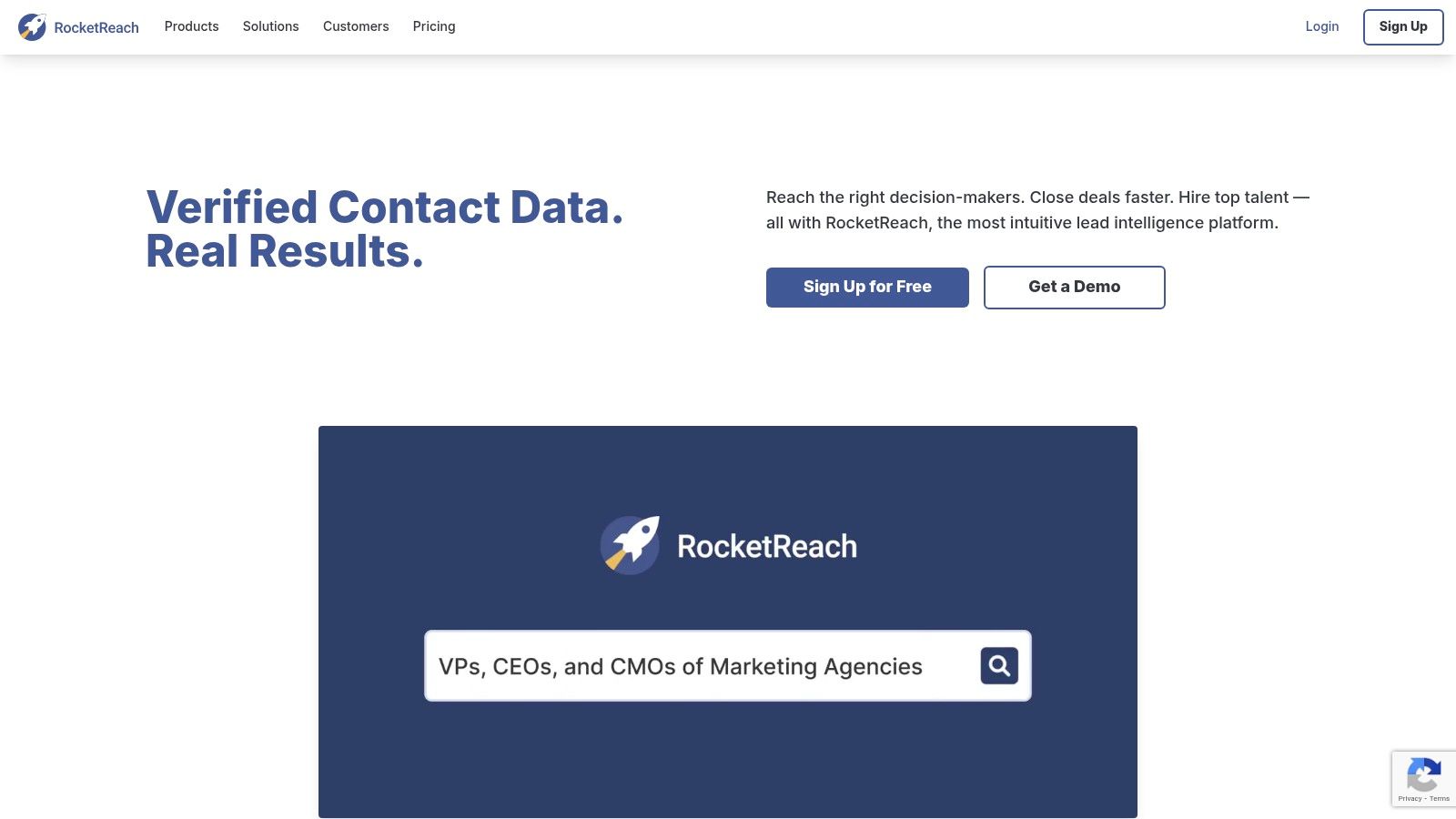
What solidifies RocketReach's place among the best sales intelligence tools is its blend of simplicity and scale. Users can perform individual person or company searches, or leverage bulk lookup tools to enrich existing lists with speed. While it might not have the deep intent data of larger platforms, its strength lies in its core function: providing accurate contact details on demand. This makes it an indispensable tool for recruiters, sales development reps, and founders who value speed and efficiency in their outreach efforts.
Key Features & Use Cases
Person and Company Search: Quickly find verified email addresses and mobile or direct phone numbers for specific prospects.
Browser Extension & Bulk Lookups: Seamlessly find contact info while browsing LinkedIn or upload entire lists for fast enrichment.
API Access: Integrate RocketReach’s data directly into your own applications and workflows for automated contact discovery.
Website: https://rocketreach.co
Pros & Cons
8. SalesIntel
SalesIntel enters the market with a powerful commitment to data quality, centering its platform on human-verified B2B contacts. While others rely heavily on machine scraping, SalesIntel boasts a 90-day phone verification process for its direct dials and mobile numbers, a detail that can dramatically improve connect rates for sales development teams. This dedication to accuracy makes it a compelling choice for organizations that are tired of burning through leads due to outdated or incorrect contact information.
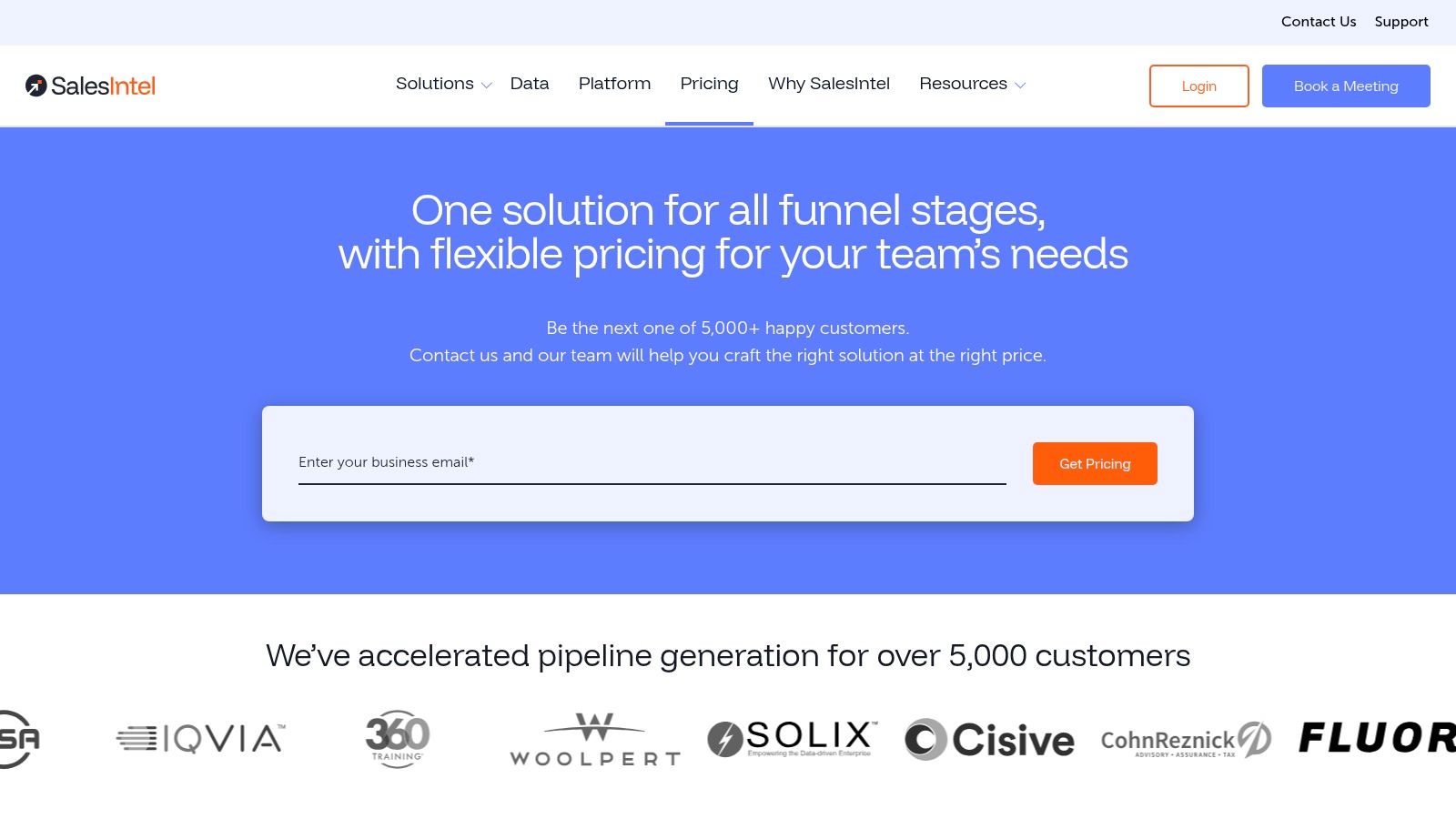
What makes SalesIntel one of the best sales intelligence tools is its unique Research-on-Demand service. If a specific contact you need isn't in their database, you can use credits to have their team find and verify it, typically within a few hours. This human-in-the-loop approach is a lifesaver for teams targeting niche industries or hard-to-reach executives. Features like VisitorIntel de-anonymize your website traffic, adding another layer of insight that complements traditional prospecting and elevates your relationship intelligence strategy.
Key Features & Use Cases
Human-Verified B2B Data: Access highly accurate, 90-day phone-verified mobile numbers and direct dials for improved connect rates.
Research-on-Demand: Submit requests for their research team to find and verify specific contacts that are not already in the database.
VisitorIntel: Identify anonymous companies visiting your website to uncover new, high-intent leads for your pipeline.
Website: https://salesintel.io/pricing
Pros & Cons
9. LeadIQ
LeadIQ is a prospecting-focused tool built for speed and efficiency, especially for sales development reps (SDRs) who live on LinkedIn. It streamlines the often tedious process of finding and capturing contact information, allowing reps to build lists quickly and push verified data directly into their sales engagement platforms or CRM. Its Chrome extension is the star of the show, making it incredibly easy to grab prospects while browsing profiles and company websites.
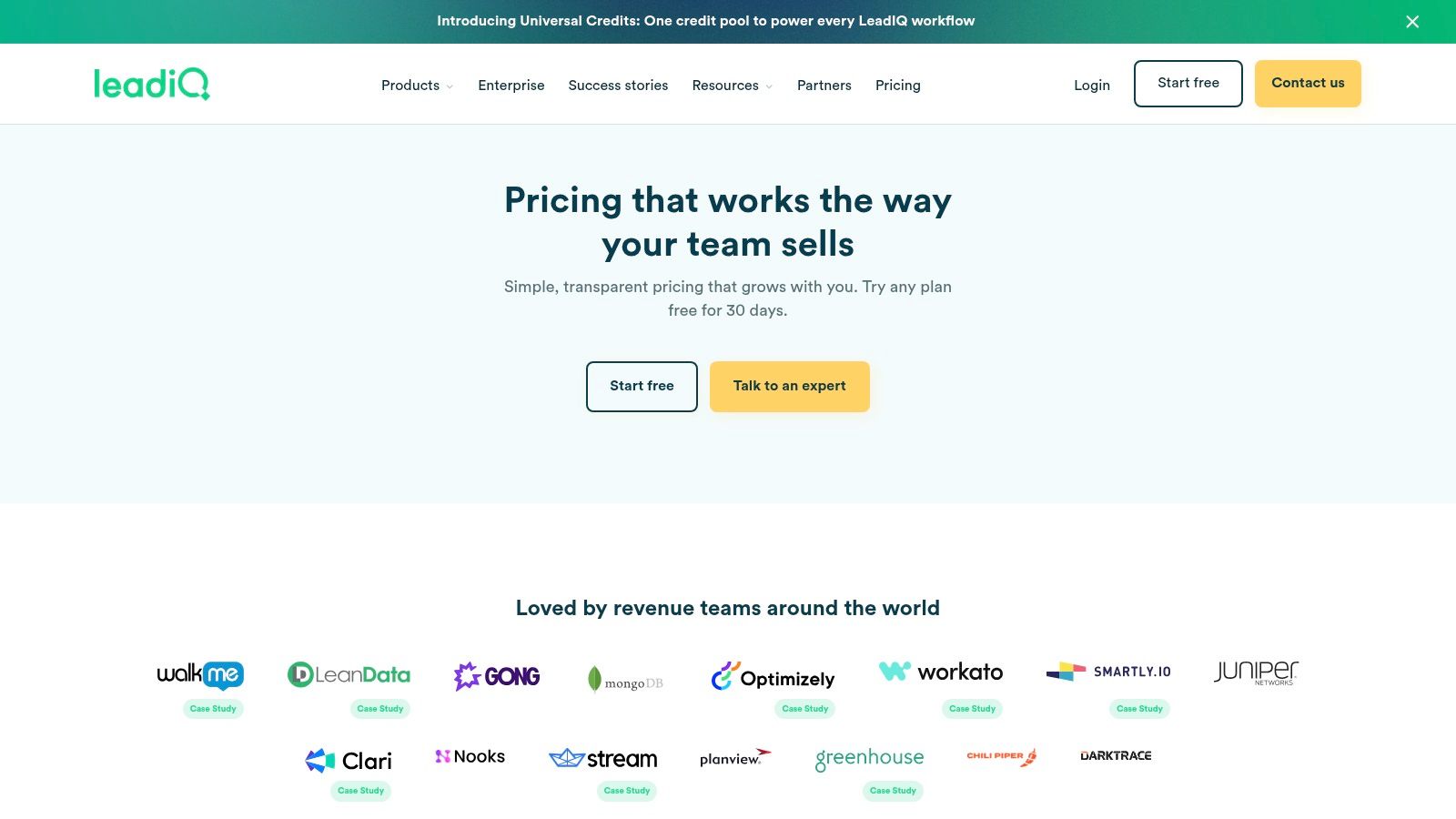
What makes LeadIQ one of the best sales intelligence tools for high-velocity teams is its laser focus on the SDR workflow. Instead of being an all-encompassing data behemoth, it excels at its core function: capturing verified emails and mobile numbers with a single click. The platform also includes valuable signals like job-change tracking, alerting reps when a past champion moves to a new target account. This combination of speed, ease of use, and transparent pricing makes it a fantastic choice for teams looking to empower their reps without the complexity of an enterprise-grade solution.
Key Features & Use Cases
One-Click Capture Extension: Instantly find and save verified contact data from LinkedIn Sales Navigator and company websites.
Job-Change Tracking: Receive alerts when key contacts change roles, creating timely outreach opportunities.
Seamless Integrations: Sync captured contacts and data directly to popular CRMs and SEPs like Salesforce and Outreach.
Website: https://leadiq.com/pricing
Pros & Cons
10. Demandbase — Demandbase One
Demandbase One positions itself not just as a data provider, but as a complete go-to-market platform built around Account-Based Experience (ABX). It masterfully unifies sales intelligence, account intent data, advertising, and marketing orchestration into a single cohesive system. For organizations where tight alignment between sales and marketing is non-negotiable, Demandbase provides the common ground and shared intelligence needed to surround, engage, and win their most important target accounts.
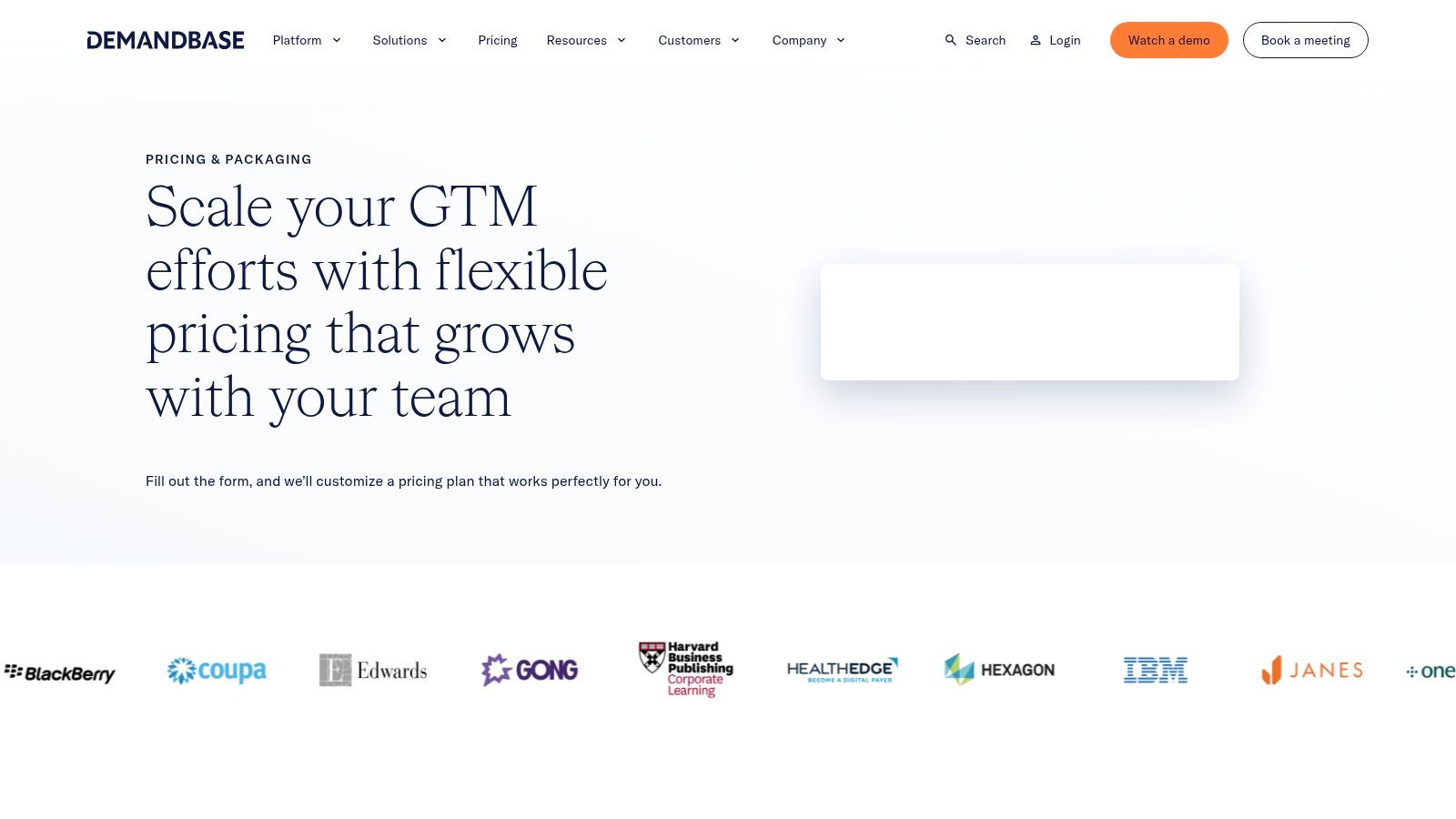
What makes Demandbase one of the best sales intelligence tools is its platform approach to ABM. It moves beyond simple contact lookups to provide deep, account-level intelligence, revealing which companies are in-market and what they're researching. By combining this with its own advertising DSP and orchestration capabilities, it allows teams to act on intelligence instantly, launching targeted ad campaigns or sales plays directly from the platform. This creates a powerful, unified motion that sales and marketing can execute together.
Key Features & Use Cases
Account-Level Intelligence: Get a 360-degree view of target accounts, including firmographics, technographics, and intent signals.
Site De-anonymization: Identify which of your target accounts are visiting your website, even if they don't fill out a form.
Advertising & Orchestration: Launch cross-channel advertising campaigns and trigger sales plays based on account behavior and intent.
Website: https://www.demandbase.com/pricing/
Pros & Cons
11. Crunchbase
Crunchbase has carved out a powerful niche as the go-to intelligence platform for understanding the private company landscape, especially within the startup and venture capital ecosystem. While many tools focus purely on contact data, Crunchbase excels at providing deep company-level insights, funding history, and investment trends. It's an indispensable resource for teams conducting market research, identifying high-growth companies, and building a top-of-funnel strategy based on company signals rather than just individual contacts.
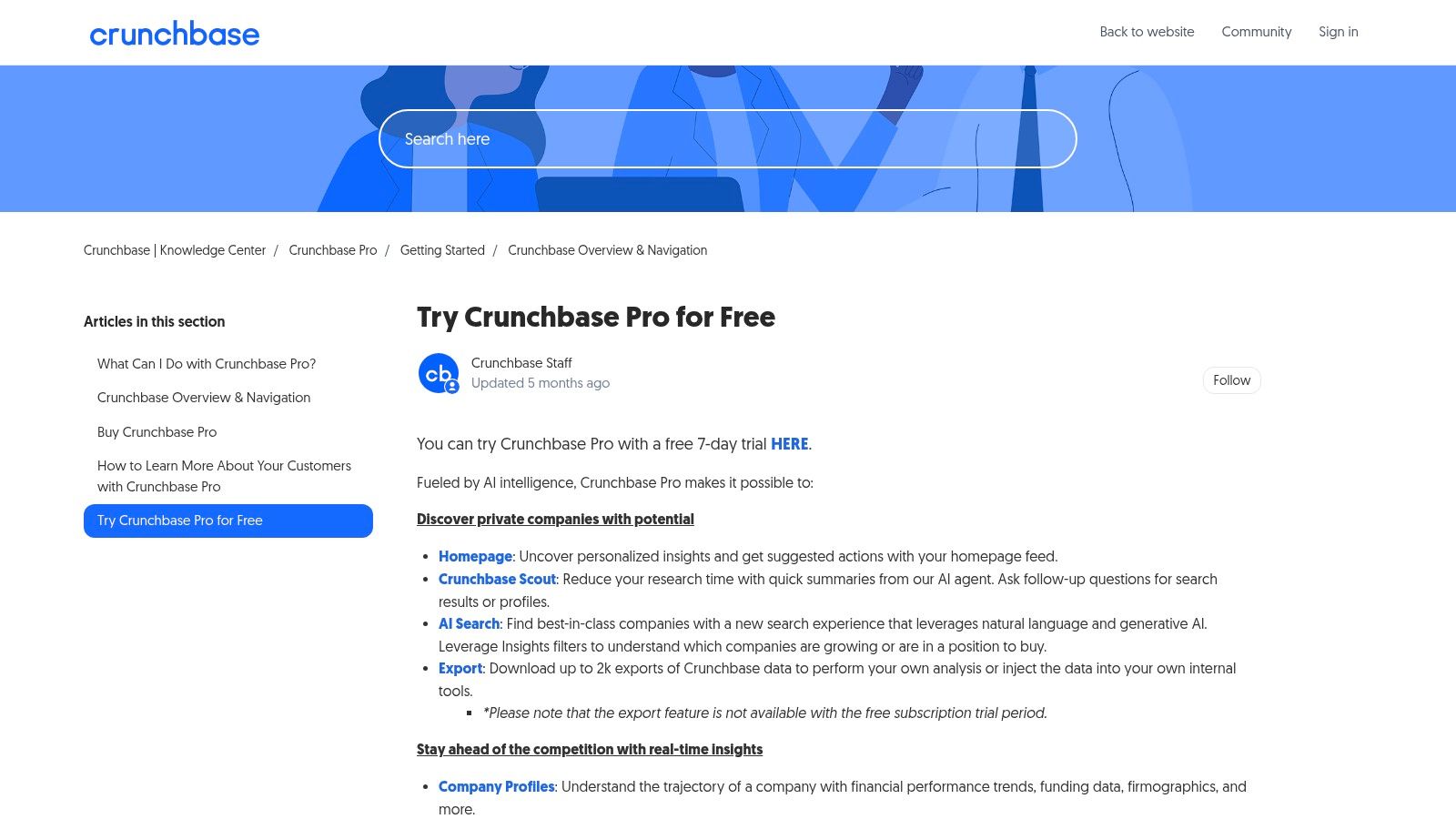
What makes Crunchbase one of the best sales intelligence tools is its focus on company discovery and trigger events like funding rounds. Its AI-powered search and predictive insights help sales teams identify emerging players and potential future giants long before they appear on traditional databases. With alerts, lists, and dashboard tracking, you can monitor key accounts or entire market segments, making it perfect for research-led prospecting where understanding a company's story and momentum is critical to opening doors.
Key Features & Use Cases
AI-Powered Company Search: Discover and analyze private market companies based on industry, funding, and growth signals.
Alerts & Tracking: Get real-time notifications on funding rounds, leadership changes, and other key buying signals.
Optional Contact Data: Enhance company research with add-on contact packages and direct Salesforce integration for prospecting.
Website: https://support.crunchbase.com/hc/en-us/articles/360015516253-Try-Crunchbase-Pro-for-Free
Pros & Cons
12. HubSpot — Breeze Intelligence
For the millions of businesses already living inside HubSpot, the introduction of Breeze Intelligence is a game-changer, transforming their CRM from a system of record into a native sales intelligence powerhouse. Breeze embeds enrichment, buyer intent, and reverse-IP identification directly within the HubSpot ecosystem, eliminating the need for clunky third-party integrations. This unified approach is designed to give sales and marketing teams a seamless way to discover their total addressable market and prioritize the right accounts without ever leaving the platform.
What makes Breeze one of the best sales intelligence tools for HubSpot users is its deep integration and simplified consumption model. All its powerful features, including AI agents that accelerate go-to-market tasks, are consumed via a single HubSpot Credits system across Sales, Marketing, and Service Hubs. This model simplifies billing and makes advanced intelligence accessible across the entire GTM organization. Understanding how this intelligence layer connects to your core system is crucial, and you can explore more about how a modern CRM unlocks business growth to see the full picture.
Key Features & Use Cases
Native HubSpot Enrichment: Automatically enrich contact and company records with accurate data directly within your CRM.
Integrated Buyer Intent & IP-Reveal: Identify anonymous website visitors and pinpoint accounts showing active buying signals.
Breeze AI Agents: Leverage AI-powered copilots to accelerate GTM tasks like list building and account research.
Pros & Cons
Top 12 Sales Intelligence Tools Comparison
From Data Overload to Deal Closed: Choosing Your Ideal SI Tool
You've just navigated a deep dive into the 12 best sales intelligence tools on the market, from the data- behemoths like ZoomInfo to the relationship-centric innovators like Yena. The journey through features, integrations, and pricing models can feel overwhelming, but the core takeaway is simple: the right tool doesn't just give you more data, it gives you the right data, paired with a clear path to action.
The era of blasting thousands of cold emails and hoping for a 1% reply rate is fading fast. Success in today's hyper-competitive landscape, especially for high-value deals in executive search, venture capital, and strategic partnerships, hinges on one critical factor: trust. Raw contact information from platforms like Lusha or RocketReach is a starting point, but it's not a strategy. The real power lies in transforming a cold lead into a warm introduction.
Key Takeaways: From Data Points to Handshakes
As you make your decision, let's distill the most crucial insights from our analysis. Moving forward, keep these core principles at the top of your mind to ensure you select a platform that truly drives revenue and builds lasting relationships.
Data is a Commodity, Relationships are the Differentiator: While access to accurate contact data is table stakes, the true value emerges when you can map a trusted path to that contact. This is the fundamental difference between a tool that fills your CRM and one that fills your calendar with meetings.
Context Over Quantity: Having millions of contacts is useless if you can't identify the handful that matter and the best way to approach them. Tools like 6sense and Demandbase excel at identifying intent, while relationship intelligence platforms like Yena provide the "how" to capitalize on that intent through your existing network.
Integration is Non-Negotiable: Your sales intelligence tool must be a seamless extension of your workflow, not another siloed platform. Deep integration with your CRM (like HubSpot or Salesforce) and sales engagement tools (like Outreach or SalesLoft) is essential for adoption and ROI.
Your Next Steps: A Practical Framework for Selection
Feeling empowered? Great. Now, let's turn that knowledge into a decision. Choosing from the best sales intelligence tools requires a strategic, inward-looking approach before you sign any contracts. Don't get distracted by flashy feature lists; focus on your team's unique DNA.
Define Your Primary Use Case: Are you a high-volume SDR team needing endless contact details (Apollo.io, Lusha)? Or are you a business development team where one warm introduction is worth a thousand cold calls (Yena)? Be brutally honest about what moves the needle for your business.
Audit Your Existing Network: Before investing in a tool to find strangers, understand the power of the network you already have. Your team, investors, and advisors hold the keys to countless warm introductions. A platform that unlocks this collective "who-knows-who" can deliver immediate, high-impact results.
Prioritize User Experience and Adoption: The most powerful tool is the one your team actually uses. A complex interface will lead to poor adoption and wasted investment. Run trials with your core users and gather their direct feedback. Is the platform intuitive? Does it save them time? Does it deliver "aha!" moments?
Balance Your Tech Stack: Think of your sales intelligence solution as a strategic layer. You might use Apollo.io for raw data enrichment but layer Yena on top to find the warm introduction paths to your highest-value prospects. The goal isn't one tool to rule them all, but a synergistic stack that covers both data acquisition and relationship activation.
The future of sales isn't about shouting louder; it's about connecting smarter. By shifting your focus from simply collecting contacts to strategically leveraging relationships, you're not just buying software. You are investing in a more intelligent, effective, and human way of doing business. The right tool will empower your team to close bigger deals, faster, by turning every cold outreach into a warm conversation waiting to happen.
Ready to stop chasing cold leads and start leveraging warm introductions? See how Yena transforms your team's collective network into a powerful deal-closing engine. Discover the trusted path to your next customer, candidate, or partner by exploring Yena today.

Comments